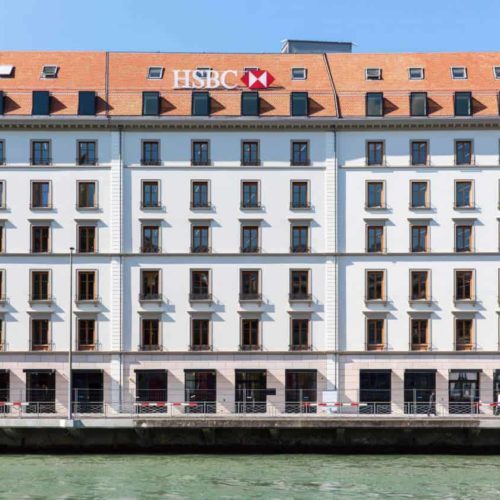Introduction
Swiss prosecutors have opened a criminal investigation against HSBC Private Bank, and raided the bank’s Geneva offices for evidence as it probes allegations of “aggravated money-laundering.”
Citing “recent public revelations” about HSBC’s activities in Switzerland, the prosecutor’s office warned that the investigation could extend to individual employees at the bank as it probes whether adequate measures were put in place to prevent criminal activity.
Attorney general Olivier Jornot and first prosecutor Yves Bertossa led the search of HSBC’s Geneva headquarters this morning, along with plain clothes investigators and financial analysts, according to ICIJ’s media partner Le Temps. The bank’s compliance department offices were also searched.
The raid comes amid growing scrutiny of the bank following ICIJ’s Swiss Leaks investigation. Together with more than 140 journalists from more than 50 media outlets, ICIJ analyzed a series of leaked files based on information taken from HSBC’s Swiss branch and handed to French authorities by former bank employee and IT specialist Hervé Falciani.
The Swiss Leaks revealed that the bank played an active role in assisting some clients with tax evasion, and also continued to serve other clients after they had been unfavorably named by the United Nations, in court documents and in the media as connected to arms trafficking, conflict diamonds and bribery.
HSBC conceded to ICIJ and its media partners that standards at the bank’s Swiss branch were “significantly lower” at the time covered by the leaked files (which include account details up to 2007), but said “significant steps” had been taken since then to implement reform and end business with questionable clients. The bank claims to have reduced its client base by almost 70 percent since 2007.
Since the publication of the Swiss Leaks investigation, there has been pressure from inside Switzerland for action against HSBC.
In response to the Swiss prosecutor’s announcement on Wednesday, the bank issued a brief statement reiterating that it would continue to cooperate fully with Swiss authorities.
HSBC currently faces criminal investigations in France, Belgium and Argentina. Regulators and politicians in other countries have also announced pending investigations into either the bank or some of its Swiss clients.
In the United States, a law enforcement official confirmed to the Center for Public Integrity that the Department of Justice’s tax division has been investigating HSBC for tax crimes since 2010, using the leaked HSBC files which came to the department via the Internal Revenue Service. However nominee attorney general Loretta Lynch, who faces questions over her 2012 deal with HSBC as part of a federal money-laundering prosecution, did not have access to the leaked files as part of her own investigation into the bank, which was initiated by a separate DOJ division.
The Geneva raid follows the banking giant issuing a formal apology via full-page newspaper ads in the United Kingdom.
HSBC published a full-page advertisement in several Sunday newspapers containing an apology to the bank’s customers and employees in the form of an open letter signed by chief executive Stuart Gulliver. Gulliver described the Swiss Leaks news coverage as a “painful experience” but said the bank’s Swiss branch had been “completely overhauled” in the years since the data was taken and leaked to authorities.
Following revelations that HSBC’s Swiss branch serviced some clients with criminal backgrounds and aided other clients evading taxes, backlash has been particularly virulent for both the bank and politicians in HSBC’s home country of Britain, where fierce debate has broken out on the floor of parliament, and where two separate investigations have been launched.
Lord Stephen Green, the former HSBC boss who was appointed trade minister by Prime Minister David Cameron in 2011, resigned from his position with influential banking lobby group TheCityUK amid growing political pressure around how much the government knew of his role at the bank at the time of his appointment.
Then yesterday, former chief political commentator for London’s Daily Telegraph Peter Oborne spoke out against the newspaper’s lack of coverage of the Swiss Leaks affair, and called for an independent inquiry into the paper’s editorial guidelines.
Oborne cited perceived interference from management and owners in editorial coverage as a reason for his resignation, and said the paper’s lack of coverage of the Swiss Leaks story was part of pattern concerning critical stories about HSBC, a major advertiser with the Telegraph.
“The Telegraph’s recent coverage of HSBC amounts to a form of fraud on its readers. It has been placing what it perceives to be the interests of a major international bank above its duty to bring the news to Telegraph readers,” he wrote in an opinion piece for Open Democracy that has since been widely reported by the British press.
Read more in Accountability
Accountability
White-nationalist group that influenced alleged Charleston shooter is subsidized by American taxpayers
Council of Conservative Citizens is ‘social welfare’ organization that pays no federal taxes
Accountability
How the World Bank breaks its promise to protect the poor
Since 2004 an estimated 3,350,449 people were forced from their homes, deprived of their land or had their livelihoods damaged because they lived in the path of a World Bank project.

Join the conversation
Show Comments